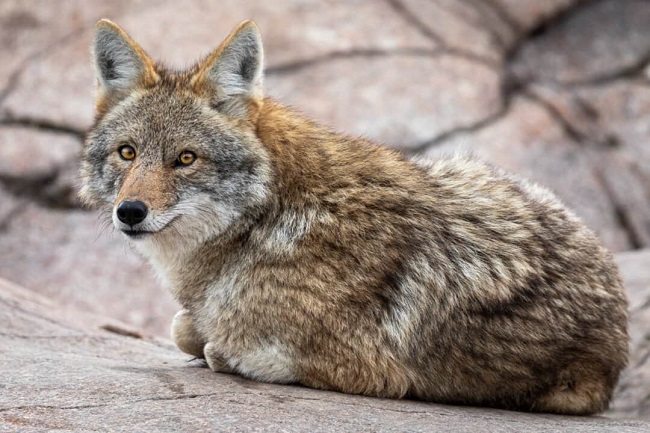With their striking resemblance to dogs, coyotes have sparked curiosity among many animal lovers about their potential as domestic pets.
However, the notion of having a coyote as a pet extends far beyond their physical resemblance to our familiar canine friends.
This article investigates the aspects of coyote domestication, the legality of owning them as pets, and other considerations to explore the reality behind the concept of pet coyotes.

Can We Keep Coyotes as Pets?
Coyotes, part of the Canidae family, are closely related to domestic dogs. However, their evolutionary paths diverged thousands of years ago. The wild instincts and behavioral traits ingrained in coyotes create significant challenges for domestication.
Read Also:
Wild Instincts and Behavior
As wild animals, coyotes have strong survival instincts. They are solitary creatures and territorial by nature. While young coyotes might initially appear trainable, as they mature, their unpredictable and often destructive behavior can become overwhelming for a pet owner.
Compatibility with Humans and Other Pets
Coyotes are not inherently sociable with humans or other domestic animals. They may pose a risk to smaller pets due to their predatory instincts. Furthermore, they do not typically display the affectionate behaviors associated with dogs, which can make bonding difficult.
Is it Legal to Own a Coyote as a Pet?
In many jurisdictions, the ownership of coyotes as pets is illegal.
International Laws
Internationally, the trade of coyotes is overseen by organizations such as CITES. While coyotes aren’t classified as endangered, their trade is still monitored due to concerns over humane treatment and environmental impact.
Domestic Laws
In the United States, legalities vary significantly by state. Many states have strict regulations against owning wildlife as pets, including coyotes.
Some states may permit ownership with specific licenses, but these are generally issued for educational or conservation purposes rather than pet ownership.
Ethical Considerations of Owning a Coyote
Before considering a coyote as a pet, potential owners should evaluate the ethical implications.
Wildlife Conservation
Removing coyotes from their natural habitats disrupts ecosystems and can negatively impact wild populations. Additionally, captive environments often fail to fulfill the complex needs of these animals, leading to stress and behavioral problems.
Safety Risks
As wild animals, coyotes can pose safety risks to humans, particularly if they feel threatened. Their natural behaviors and powerful physical capabilities make them potentially dangerous, especially in a domestic setting.
Coyotes in Popular Culture and Media
Despite the difficulties associated with owning a coyote as a pet, they have held a certain allure in popular culture and media. This fascination can often blur the line between fiction and reality, further driving the interest in owning such an animal.
Coyotes in Films and TV Shows
Coyotes have appeared in numerous films and TV shows, often anthropomorphized or depicted alongside human characters. However, these representations can be misleading, creating an illusion of domesticity that doesn’t exist in reality.
Celebrity Ownership of Exotic Pets
There have been instances of celebrities owning exotic pets, including wild canines. This can sometimes lead to a misguided desire to own such pets among the public.
It is crucial to remember that these instances are the exceptions, not the norm, and come with significant responsibility and potential legal implications.
The Rehabilitation and Rescue of Coyotes
Another aspect of the interaction between humans and coyotes is the work done by wildlife rehabilitation and rescue centers.
Rehabilitation Centers
Wildlife rehabilitation centers are equipped to care for coyotes that have been injured or orphaned. These professionals have the expertise and resources to provide the necessary care with the ultimate goal of releasing these animals back into the wild.
The Role of Rescue Centers
Rescue centers often take in coyotes that have been kept illegally or abandoned by owners who could not care for them. These organizations aim to provide a suitable environment for these animals and, if possible, reintroduce them into the wild.
Potential Alternatives to Owning a Coyote
For those fascinated by coyotes but understanding of the challenges of owning one, there are several ways to engage with these animals without attempting to domesticate them.
Wildlife Tours and Safaris
Participating in organized wildlife tours and safaris can provide close encounters with coyotes in their natural habitats. This allows for observation and appreciation without the challenges and ethical dilemmas of ownership.
Supporting Conservation Efforts
Supporting conservation organizations dedicated to protecting and studying coyotes is another great way to engage. This can be done through donations, volunteering, or participating in citizen science projects.
Read Also:
Conclusion
While the idea of owning a coyote might seem intriguing, the realities of such an undertaking reveal a different picture. Coyotes are wild animals with instincts and behaviors unsuitable for domestic life.
Prospective owners must understand the legal and ethical issues, along with the inherent dangers and responsibilities, associated with owning a coyote.
Ultimately, these unique animals are best admired from a distance, allowed to live freely and wildly as nature intended.
























